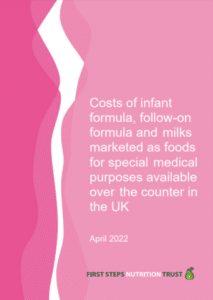The Competition and Markets Authority (CMA) has today released its long-awaited report on the infant and follow-on formula market, confirming that prices have soared, and that robust interventions are needed to better support families in informed decision making around product choice. The report findings and recommendations are based on updated consumer research as part of the CMA market study, exploring consumers’ experiences in the infant formula market, and aim to deliver better outcomes for parents who depend on infant formula to feed their babies.
As a member of The Baby Feeding Law Group UK, and in partnership with First Steps Nutrition Trust, the iHV has long campaigned for stronger formula regulations and better enforcement around the marketing of infant formula. We welcome the report’s findings and key recommendations to governments for action to improve outcomes for parents by:
- Eliminating brand influence in healthcare settings:
- Timely, clear, accurate and impartial information on nutritional sufficiency of infant formula products in healthcare settings.
- Standardised infant formula labelling in healthcare settings.
- Equipping parents to make strong choices in retail settings:
- Clear, accurate and impartial information on the nutritional sufficiency of all infant formula products on retail shelves and in online shopping channels.
- Display all brands of infant formula together on retail shelves and in a separate cluster from all brands of other formula milks.
- Strengthening labelling and advertising rules:
- Clear, accurate and impartial information on the nutritional sufficiency of all infant formula products on product labelling.
- On-pack messaging – prohibiting intangible and/or non-verifiable messages on infant formula and follow-on formula labels.
- Extending the restriction on advertising to follow-on formula.
- Clarify what constitutes advertising.
- Permit the use of gift cards, vouchers, loyalty points and coupons in lieu of cash to purchase infant formula.
- Effective enforcement:
- Governments to assess whether infant formula and follow-on formula labels are ‘clearly distinct’ and communicate assessment to manufacturers and enforcers.
- Competent authority to pre-approve product labels.
The report’s authors stress that the UK, Northern Irish, Scottish and Welsh governments must now act swiftly to implement these measures and maintain the momentum for effective reform.
Dr Vicky Sibson, Director of First Steps Nutrition Trust, said:
“The CMA’s findings reflect the lived experience of many families – infant formula is prohibitively expensive, while families are being manipulated by misleading marketing. Stronger, enforced regulations are needed to protect parents, carers and their babies. We welcome today’s recommendations and urge the UK, Northern Irish, Scottish and Welsh governments to build on this progress by ensuring swift implementation. It is vital that the cost of infant formula is brought down across the board and in the long term.”
The Baby Feeding Law Group UK is disappointed that the CMA has not explicitly acknowledged the need for stronger digital marketing regulations and has failed to recommend price controls. It is essential that UK legislation is updated to protect families from these highly effective and inappropriate marketing practices. Stronger interventions are also needed to ensure families who use formula can afford it and not resort to dangerous feeding practices. We agree with the CMA that if the proposed package of measures does not achieve the desired outcomes within a reasonable timeframe, it will be essential to reconsider the need for more direct price controls for essential formula milks.
Baroness Walmsley, chair of the House of Lords all party inquiry entitled ‘Recipe for health: a plan to fix our broken food system’ said:
“I welcome the CMA’s report, but the government must now ensure it is implemented. The pre-authorisation must be independent of the industry and parents must have accurate information such as the fact that follow on milks and toddler milks are not needed. Then we need to move on to tackling the advertising of foods for toddlers.”
Responding to the report, Alison Morton, iHV CEO said,
“Shopping for infant formula in the UK has become a minefield. This welcomed report lays bare the harsh fact that parents are being exploited by misleading advertising. The industry preys on parents’ overriding motivation to do “what is viewed to be best for their baby” – with aggressive corporate marketing tactics motivated by profit, pressurising parents to purchase a higher priced product under the misguided belief that it is better quality.
“Parents and babies deserve better. At a time when more families are living in poverty or struggling to make ends meet, it is vital that all parents have access to clear, accurate and impartial information to make informed choices, and can save money by switching to the cheapest infant formula brands. Implementing stricter guidelines with effective enforcement to end exploitative practices cannot come soon enough. The iHV fully supports all the recommendations in the CMA report”.








